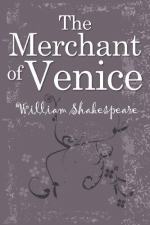|
This section contains 9,222 words (approx. 31 pages at 300 words per page) |

|
SOURCE: "'Thrift is Blessing': Exchange and Explanation in The Merchant of Venice," in Shakespeare Quarterly, Vol. 37, No. 1, Spring, 1986, pp. 20-37.
In the following essay, Engle contends that the relationships in the play transcend emotional boundaries and are all to some degree economic or legal in nature. Engle goes on to argue that a discussion of the play's plot in financial terms suggests avenues of historical interpretation and criticism which focus on credit and marriage as the primary means by which Elizabethan gentry and aristocracy raised money.
"Those critics who idealize the Venetians," René Girard comments of The Merchant of Venice, "write as if the many textual clues that contradict their view were not planted by the author himself, as if their presence in the play were a purely fortuitous matter, like the arrival of a bill in the morning mail when one really expects a love letter."1 As...
|
This section contains 9,222 words (approx. 31 pages at 300 words per page) |

|


